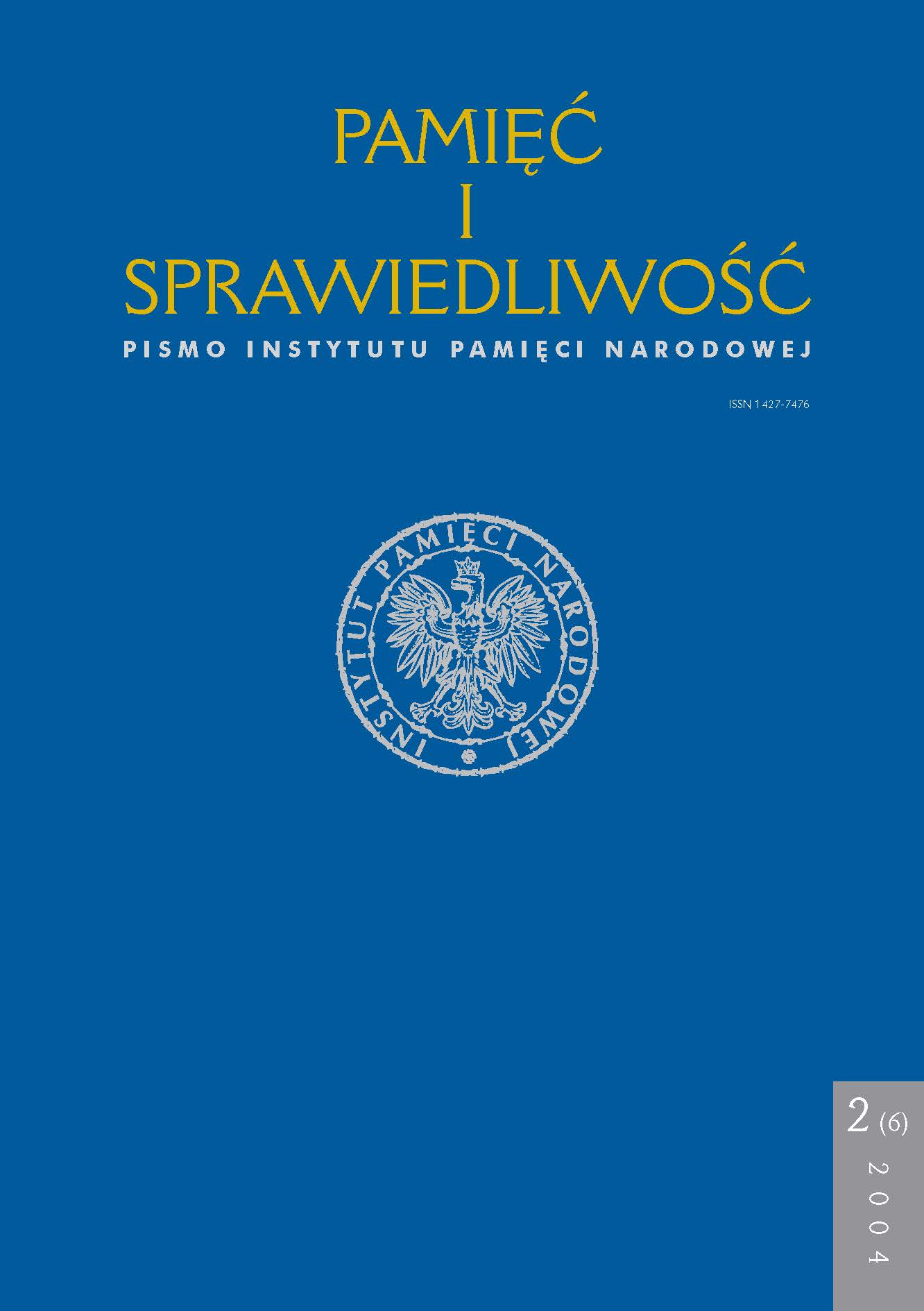Białorusini polscy w okresie przełomu (1939–1945)
Pamięć i Sprawiedliwość, Tom 6 Nr 2 (2004), strony: 83-113
Data publikacji: 2004-12-30
Abstrakt
Belarussians are one of the youngest European nations. In the first half of the 20th century they were still in the process of developing their national consciousness, which was difficult because of the country’s geographical situation between Poland and Russia. In the interwar period these countries divided Belarussia into two parts and started political, economic and cultural expansion on its territory. On the other hand, large international conflicts of the 20th century speeded up the formation of a modern Belarussian nation. The Second World War was in some ways a turning point for Belarussians. Vast material
war damages, as well as sufferings and death of several thousand people (in western part of Belarussia) were accompanied by vehement political, economic and social transformations, which resulted in a change of the traditional lifestyle. One of the most important effects of the war was a rapid growth in national consciousness. Another phenomenon was Polonisation of those Belarussian people who identified with vastly Catholic Polish culture and state. The overwhelming majority of Belarussians still did not have a clear national consciousness and identified only with their region (the locals, „Poleszuks”) or religion (Catholic, Orthodox). The accelerated development of national identity was accompanied by a rather fast development of political consciousness. During the war pro-Polish, pro-Soviet and pro-German circles appeared among the Belarussian people and opted for the corresponding national
status. War-time changes led to important transformations of social structure of the Belarussian society. Belarussian foresters, who were deported into USSR together with Polish foresters
during the first large deportation of 10th February 1940, were gone, as well as innumerous Belarussian Orthodox gentry. New social and professional groups emerged, such as kolkhoz workers, civil servants and teachers. Changes of the social structure (consolidated with secular tradition), ownership and
mentality of the Belarussian society had a great impact on the attitudes towards other nations who lived in north-eastern parts of pre-war Poland. One of their important effects were nationalistic conflicts, which emerged from breaking the „social balance” by nations who had been discriminated, i.e. Belarussians. The biggest conflict was between the Poles and the Belarussians. Another conflict was that between the Germans and the Belarussians, which was provoked by the wrong occupation policy of German authorities. The diversity of political options, caused by rivalry between several centers of power, led to a tragic division in the society. Belarussians often stood on the opposite sides of the battlefield, believing that they fought for their country. It resembled the situation of Poles during the WW I, who found themselves in the armies of three different invaders fighting with each other.
During the war the process of modernizing the Belarussian society and of changing the traditional lifestyle started. It was also the beginning of Sovietization, which fully developed after the end of the war on the territory of Belorussian SSR. The Sovietization was accompanied by Russification, which in the post-war period led to the dominating role of the Russian culture.
Inne teksty tego samego autora
- Joanna Sadowska, Jerzy Eisler, Łukasz Kamiński, Marek Wierzbicki, Młodzież w PRL. Dyskusja , Pamięć i Sprawiedliwość: Tom 17 Nr 1 (2011)
- Joanna Sadowska, Marek Wierzbicki, [Recenzja] Joanna Sadowska, „Sercem i myślą związani z partią”. Związek Młodzieży Socjalistycznej (1957–1976). Polityczne aspekty działalności, Wydawnictwo Trio, Warszawa 2010 , Pamięć i Sprawiedliwość: Tom 17 Nr 1 (2011)
- Marek Wierzbicki, Sowiecka polityka ekonomiczna na ziemiach wschodnich przedwojennej Polski (tzw. Zachodniej Ukrainie i Zachodniej Białorusi) w latach 1939–1941 , Pamięć i Sprawiedliwość: Tom 14 Nr 1 (2009)
- Marek Wierzbicki, Między męczeństwem a przystosowaniem. Kościół katolicki w Europie Środkowo-Wschodniej pod rządami komunistów (1944–1989) , Pamięć i Sprawiedliwość: Tom 29 Nr 1 (2017)
- Marek Wierzbicki, [Recenzje] Jerzy Grzybowski, Pogoń między Orłem Białym, Swastyką i Czerwoną Gwiazdą. Białoruski ruch niepodległościowy w latach 1939–1956, Warszawa 2011, ss. 907 , Pamięć i Sprawiedliwość: Tom 22 Nr 2 (2013)
- Marek Wierzbicki, Andrzej Żbikowski, [Recenzja] W odpowiedzi na recenzję Andrzeja Żbikowskiego: Marek Wierzbicki, Polacy i Żydzi w zaborze sowieckim. Stosunki polsko-żydowskie na ziemiach północno-wschodnich II Rzeczypospolitej pod okupacją sowiecką (1939–1941), Wydawnictwo „Fronda”, Warszawa 2001, ss. 360 , Pamięć i Sprawiedliwość: Tom 3 Nr 1 (2003)
 Język Polski
Język Polski
 English
English
 Deutsch
Deutsch
 Français (France)
Français (France)
 Italiano
Italiano
 Русский
Русский


 PDF
PDF
